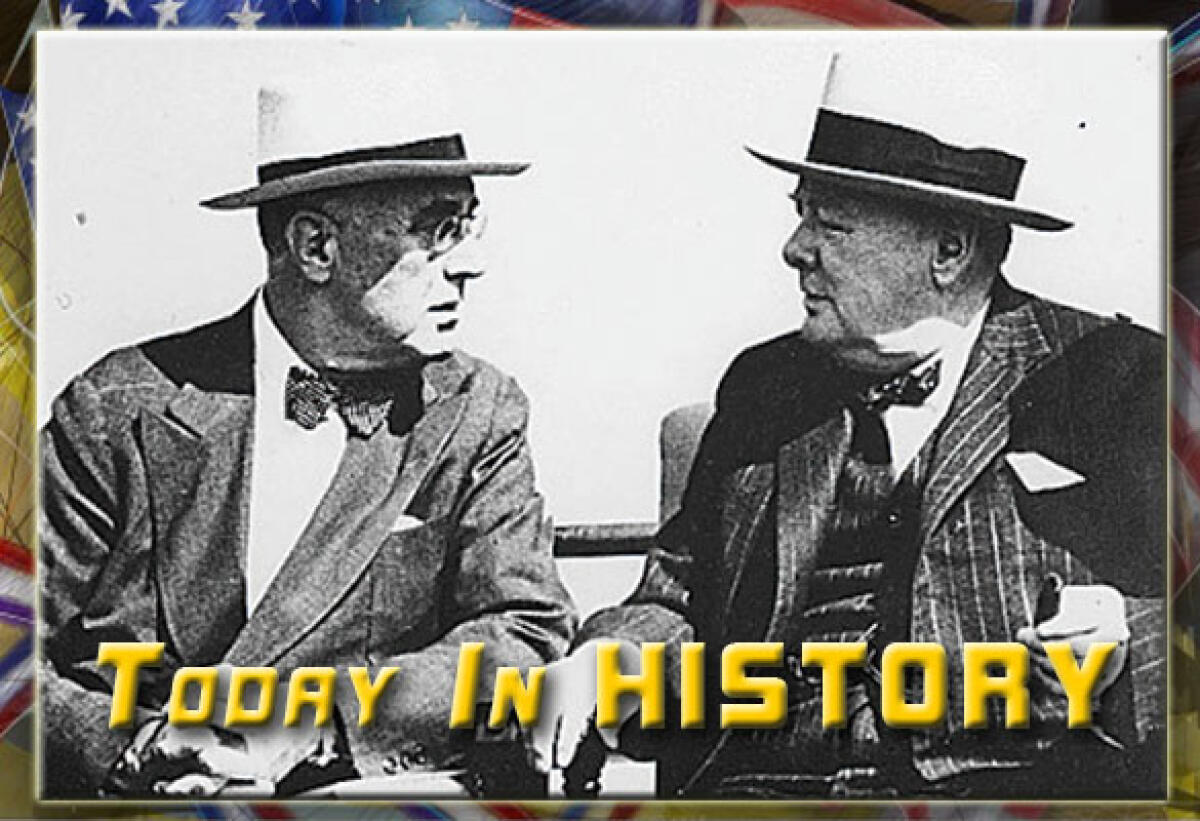- Thursday, 29 January 2026
- Have a HOT TIP? Call 704-276-6587 or E-mail us At LH@LincolnHerald.com
Today In History – September 15
There are 107 days remaining until the end of the year

Today in History in 1944 Winston Churchill and Franklin D. Roosevelt meet in Quebec as part of the Octagon conference to discuss strategy.
The on this day in history archives at “Simple English Wikipedia, the free encyclopedia” contains over 200,000 events, birthdays and deaths from 6,000 years of history. Here is a roundup of a few of them:
September 15 is the 258th day of the year (259th in leap years) in the Gregorian calendar. There are 107 days remaining until the end of the year.
EVENTS
668 – Eastern Roman Emperor Constans II is murdered in his bath.
1440 – Gilles de Rais, one of the earliest-known serial killers, is taken into custody upon an accusation brought against him by the Bishop of Nantes.
1616 – The first non-aristocratic free public school in Europe is opened in Frascati, Italy.
1762 – Seven Years' War: Battle of Signal Hill.
1776 – American Revolutionary War: British forces land at Kip's Bay, during the New York Campaign.
1789 – The United States Department of State is founded, as the Department of Foreign Affairs.
1812 – The French army under Napoleon Bonaparte enters Moscow.
1812 – War of 1812: A second supply train sent to relieve Fort Harrison is ambushed in the Attack of the Narrows.
1820 – Constitutionalist Revolution in Lisbon
1821 – Guatemala, El Salvador, Honduras, Nicaragua and Costa Rica jointly declare independence from Spain.
1830 – The Liverpool to Manchester railway line opens. On the same day, William Huskisson becomes the first railway fatality after being hit by a locomotive.
1835 – The HMS Beagle arrives in the Galapagos Islands with a young Charles Darwin on board.
1851 – Saint Joseph's University is founded in Philadelphia, Pennsylvania.
1862 – American Civil War: Confederate forces capture Harper's Ferry, then in Virginia, now in West Virginia.
1873 – Franco-Prussian War: The last German troops leave France.
1875 – Indianola, Texas, is destroyed by a Hurricane, killing between 150 and 300 people.
1894 – First Sino-Japanese War: Japan defeats China in the Battle of Pyongyang.
1916 – World War I: Tanks are used in battle for the first time, in the Somme, northern France.
1935 – With the Nuremberg Laws, the Nazis strip Jews of German citizenship.
1935 – The Nazis adopt the Swastika flag as the flag of Germany.
1940 – World War II: Climax of the Battle of Britain.
1942 – World War II: United States Navy aircraft carrier USS Wasp is torpedoed at Guadalcanal, present-day Solomon Islands.
1944 – World War II: The Battle of Peleliu (in Palau), between US and Japanese forces, begins.
1944 – World War II: Winston Churchill and Franklin D. Roosevelt meet in Quebec as part of the Octagon conference to discuss strategy.
1945 – A hurricane in South Florida and the Bahamas destroys 366 planes and 25 blimps at NAS Richmond
1947 – Typhoon Kathleen kills 1,077 people in the Kanto region of Japan.
1948 – The F-86 Sabre sets the world aircraft speed record, at 671 miles per hour (1,080 kilometres per hour).
1949 – Konrad Adenauer becomes the first Chancellor of the Federal Republic of Germany.
1950 – Korean War: US forces land at Inchon.
1952 – The UN gives Eritrea to Ethiopia.
1958 – A Central Railroad of New Jersey commuter train runs through an open drawbridge at the Newark Bay, killing 58 people.
1959 – Nikita Khrushchev becomes the first Soviet leader to visit the US.
1961 – Hurricane Carla hits Texas.
1962 – Soviet ship Poltava heads towards Cuba, one of the events that lead to the Cuban Missile Crisis.
1963 – "Birmingham Sunday" when a bomb killed 4 black girls in a church in Birmingham, Alabama.
1966 – US President Lyndon B. Johnson, responding to a sniper attack at the University of Texas at Austin, writes a letter to United States Congress urging the enactment of gun control legislation.
1968 – The Soviet Zond 5 spaceship is launched, becoming the first spacecraft to fly around the Moon and re-enter Earth's atmosphere.
1969 – US ice breaker tanker SS Manhattan passes through the Northwest Passage, after four weeks.
1972 – Scandinavian Airlines System domestic flight from Gothenburg to Stockholm, Sweden, is hijacked and flown to Malmo Bulltofta Airport.
1973 – Carl XVI Gustaf of Sweden becomes King.
1975 – The French department of Corse, on the island of Corsica, is divided in two, into Haute-Corse and Corse-du-Sud.
1981 – Vanuatu joins the UN.
1981 – The Senate Judiciary Committee approves Sandra Day O'Connor to become a Justice on the United States Supreme Court, being the first female in such a role.
1983 – Prime Minister of Israel Menachem Begin resigns.
1990 – France announces it will send 4,000 troops to the Persian Gulf.
1991 – Bangladesh becomes a parliamentary democracy.
1993 – Hans-Adam II, Prince of Liechtenstein disbands his country's parliament.
1994 – For the first time, a planet outside the Solar System is discovered.
1997 – New York City's Museum of Jewish Heritage opens.
2000 – The 2000 Summer Olympics in Sydney begin.
2007 – Former world Rally champion Colin McRae dies in a helicopter crash in Lanarkshire, Scotland, along with his son and two family friends.
2008 – Lehman Brothers files for Chapter 11 bankruptcy.
2011 – A parliamentary election is held in Denmark, resulting in Helle Thorning-Schmidt becoming Prime Minister on October 3.
2015 – Malcolm Turnbull replaces Tony Abbott as Prime Minister of Australia.
2015 – Aksel V. Johannesen becomes Prime Minister of the Faroe Islands.
2017 – 2017 Parsons Green bombing: An explosive device is detonated on a tube train near London's Parsons Green station, injuring 30 people.
2017 – The Cassini space probe's mission is ended, as it is plunged into Saturn's atmosphere.

 Lincoln Herald Staff
Lincoln Herald Staff














